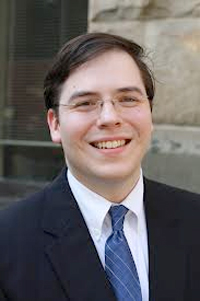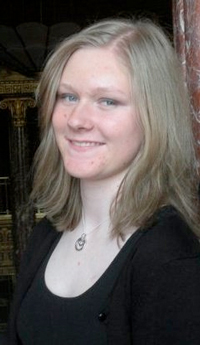by Mike Telin

Since his appointment in March of 2009, James Feddeck has firmly established COYO as one of the finest youth orchestras in North America. Under his direction the orchestra has consistently given performances of the quality that many cities would be happy to have in their own professional ensembles. Although there are many highlights that mark his tenure, taking his players on their first international tour to Prague, Czech Republic, and Vienna and Salzburg, Austria in June 2012 is especially noteworthy.
Always a gentleman in conversation, James Feddeck clearly has a passion for working with young musicians. And one can’t help but be drawn in by the enthusiasm, dedication — and above all, caring nature that he has for his young players. We reached him by telephone and began by asking him why he chose the repertoire that he did for the concert.
James Feddeck: The Youth Orchestra is now in its 27th year and they have never played any of these pieces — athough we did perform the first movement of the Dvořák a year ago as part of a special concert. But the fact that they have never played Death and Transfiguration was a surprise to me. Not that we have members who have been there for 27 years, but from a larger scale, I thought we should do some pieces that have never been done before.
Mike Telin: It’s a great program, although I am not at all familiar with the Szymanowski.
James Feddeck: [laughing] As you may have guessed, the Szymanowski is one of my “chest of drawers” pieces.
MT: I was going to ask if you found it in the chest where you keep the titles of pieces that you come across here and there.
JF: I did, and as you know I have a great love for transcriptions and this is a transcription of one of his piano etudes made by perhaps the most famous conductor of recent time in Poland, Grzegorz Fitelberg. I happen to think the transcription is better then the original, but I’m biased. It’s a short piece but really beautiful.
MT: If it was in the chest of drawers you must have heard it someplace. Do you remember where?
JF: I don’t remember but I think it was on a recording and it was one of those random pieces that you sometimes find on them. You know, everybody buys the recording for whatever the big piece is and then you find another little gem on it as well.
In fact getting the music was quite difficult but we did finally track it down. It’s a rental and it looks like it hasn’t seen the light of day in decades. So I am very happy that we can perform it.
MT: It is surprising that the orchestra has never performed the Strauss, and I must say that I was very happy to see that it will be the closing work on the program. It’s such an amazing piece. What more could you want?
JF: To me this is the kind of a piece, and perhaps you’ll agree, that if one hears it as I think it should be heard, you cannot help but be changed by it. If the piece is done properly, with the right pacing what could possibly follow it? You feel so complete, what could possibly be played after it?
MT: I understand that for many a piece about dying could be thought of as, well, depressing, but I have always thought of it as a hopeful piece.
JF: I do agree and the amazing thing is that the students had the same initial reaction to this piece as they did to the Wagner death and transfiguration that we played last year. At the first readthrough they kind of thought, OK, what’s that about? But now many say that this is their favorite piece. Again they have really gotten into it.
MT: The Dvořák is so powerful and I will be speaking with Hannah about it, but what are your thoughts?
JF: If you look at the program you’ll discover that there is no symphony, but in a way the Dvořák is like a symphony with cello solo. The orchestra is very involved and there s certainly a symphonic sense of structure to the piece in the way that his uses the orchestra.
Ten minutes with cellist Hannah Moses.

Hannah Moses: Thank you.
MT: Will this concert be your concerto debut?
HM: No, this will be my fifth. I have soloed with COYO before but it was on one of the Day of Music educational concerts. So this will be my debut on a Subscription/ticketed concert.
MT: Again, congratulations. The Dvořákis of course a staple of the cello concerto repertoire, but why did you choose it?
HM: Well it’s sort of a funny story because I originally learned the piece when I was fourteen. I have played it a few times over the years, and I used it for my college auditions as well. So I thought, why not use it for the concerto competition, and I won. So I guess it was a good choice.
MT: It is a beautiful piece, but what about it do you like?
HM: That’s a hard question because there is so much to love about it. One of my favorite aspects of playing it, especially with this orchestra, is because so many of my friends are in the orchestra. And it’s a very interactive concerto. There are parts where it’s a duet with the flute or the concertmaster so I almost feel as though I’m playing chamber music.
MT: Where do you go to school?
HM: I’m home schooled and have been my entire life. But I do take college classes at the Cleveland Institute of Music because I am in their Young Artist Program.
MT: Great! And with whom do you study?
HM: I study with Richard Weiss. He’s wonderful and this is my fifth year of studying with him so he has seen me come from a thirteen-year-old to what I am now. He’s really helped me to develop an independent voice, to find my own sound. He has also been a big part of my emotional development and has been a great role model. Personally he is a great guy and musically he has been wonderful for me.
MT: What are your plans for the future?
HM: I will continue at CIM as a first year conservatory student in Melissa Kraut’s studio. She is also fantastic and I have studied with her the past two summers at Meadowmount.
MT: Have you participated in other summer festivals?
HM: Yes, besides Meadowmount I’ve gone to the Heifetz International Music Festival. And over the years I have done a variety of camps.
MT: How did you first start playing the cello?
HM: My mom is a violin teacher so I was kind of born into the world, hearing violin in the house all the time. I wanted to play the violin from the time I was three, but she said there were too many violinists in the house. So she had me play the cello and I think everything has worked out.
MT: It appears that it has. Then why did you decide to pursue music as a career path?
HM: Music has always been an important part of my life, literally since I was born. It has always been what I wanted to do and I can’t see myself doing anything else.
MT: What other subjects do you like to study?
HM: [laughing] It’s funny because I have a sister who is really good at math and science and I was never good at those. But I really enjoy writing and languages; I’m currently taking Russian. Things like that have always been interesting to me.
MT: Writing is great and you can do so many things with it.
HM: Absolutely
MT: And Russian, that is very interesting.
HM: Yes it’s a little non-traditional but I am home schooled so I can choose.
MT: So why did you choose it?
HM: I just found it interesting and Russian literature is some of my favorite. I like to read Tolstoy and Dostoevsky so I wanted to learn the language.
MT: That’s wonderful and you have very good tastes. Finally, what are you musical aspirations — to become a soloist, teacher, etc?
HM: One of the things I am passionate about is chamber music. My dream job would be to be in a professional string quartet. And at CIM we are mentored by Peter Salaff who is great and the Cavanis are wonderful, so I have had a lot of exposure to chamber music and it is something that I really love.
Published on ClevelandClassical.com May 7, 2013
Click here for a printable version of this article.



